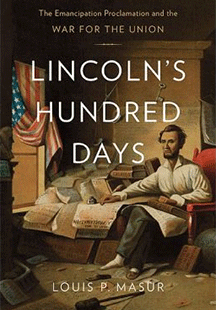By David Madden
Much debated over the past 150 years, with shifting emphases across a spectrum of opinions, the full, detailed story of the evolution of the Emancipation Proclamation has finally been chronicled, and Louis P. Masur’s achievement in his second book has been praised by Civil War and Lincoln historians Harold Holder, Adam Hood heart, and James M. McPherson.
Inevitably, some readers who have experienced the very vivid and dramatic rendering of the events that culminated in the passing of the 13th Amendment in the excellent movie Lincoln (2012) will bring great expectations, perhaps demands, to Lincoln’s Hundred Days, that it will thrill them in similar ways. Not finding that to be the case, readers will experience instead a recital of hundreds of voices, a chorus in harmony with and discordant to Lincoln’s own.
Whether speaking in dialog or conference directly with Lincoln, or in correspondence, speeches, or news reports, members of that huge chorus consisted of Henry Ward Beecher, Thurlow Weed, Salmon Chase, Thaddeus Stevens, Montgomery Blair, Whitelaw Reid, Jefferson Davis, Karl Marx, Orestes Brownson, William Sherman, Frederick Douglass, Robert E. Lee, John Greenleaf Whittier, Benjamin Butler, Wendell Phillips, William Lloyd Garrison, Gideon Welles, John Hay, William Seward, Horace Greeley, Edwin Stanton, John Charles Fremont, George McClellan, Charles Sumner, Adam Gurowski, among a good many others.
Whether pro or con on the very idea of the Proclamation or Lincoln’s progress handling it, Masur, Professor of American Studies and History at Rutgers University, offers a kind of leisurely march into, through, and out of those one hundred days from September 22, 1862 to January 1, 1863. The calling of cadence on that march is somewhat lock-step, with few pauses for reflection. Much needed during the sesquicentennial of the Emancipation Proclamation and the simultaneous sesquicentennial of the Civil War is an analytical study of that defining moment in our history. Lincoln’s Hundred Days is less a present-time study in Masur’s own voice than a recital of a multitude of voices from the past. That is a description, not a criticism. We are in need of a recital as well as a study. As Masur notes, other historians have written studies measuring the relative value of the Proclamation, a value that must be compared with the value of the 13th Amendment, which more clearly and forever freed the slaves.
Frederick Douglass and most abolitionists criticized Lincoln for a half-measure that seemed to offer more than it actually did. Lincoln acted too slow, Lincoln acted too fast, Lincoln’s acts were ambiguous were a few of the other criticisms, which included the regrettable fact that the border states and a few states under military occupation were exempt, at least until war’s end.
Arguments by Lincoln and others in support of the proclamation were that it was first of all within the president’s powers, that it was constitutional, and a military necessity, opening up the military to Negroes as soldiers, not just laboring contrabands. Readers who have studied Lincoln’s presidential conduct see in his every step the same president who conducted himself in all other areas, domestic, foreign, and military—consistently inconsistent, but ultimately victorious. Evaluations today of all his actions very much parallel evaluations of his own day.
The enduring controversy about Lincoln’s attitude toward the Negro in general and slavery in dire particular comes under examination in Masur’s chronicle of the hundred days. The colonization plan had already been proposed, bringing down upon Lincoln’s head an array of accusations and suspicions.
The recorded evidence that Masur displays gives strength to the argument that Lincoln’s motives included a very sincere desire to end slavery as an institution of evil in God’s eyes. Simultaneously, the various kinds of evidence on record reiterate Lincoln’s often-stated conviction that the primary goal of the war effort was to preserve the Union, a Union that would embrace not only the slave-less South but former slaves themselves in a kind of brotherhood. It would set an enduring example of equality and freedom for the world. Constant re-evaluations of the evidence supporting that last point will continue to prove him wrong or right.
David Madden (ΦBK, University of Tennessee, 1979) is a resident member of the Epsilon of Tennessee chapter of Phi Beta Kappa and founding Director of the United States Civil War Center, former commissioner for Louisiana of the Abraham Lincoln Bicentennial, and the author of a forthcoming collection of essays, The Tangled Web of the Civil War and Reconstruction, which will include a piece on Lincoln.




